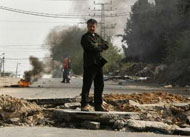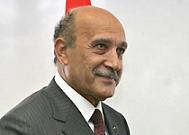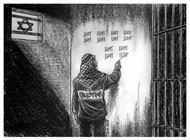A lot has been made of Israel’s intentions towards the Gaza Strip over the last few months. Commentators have analyzed and deconstructed the Israeli government’s fierce rhetoric with respect to Gaza and its ruling authority Hamas, evaluated its actions against the coastal strip and formulated parallels in the hope of deciphering Israel’s objectives concerning this small and overpopulated entity which continues to incessantly lodge itself under the skin of Israel.
What does Israel have in store for Gaza and Hamas? Arguments normally fluctuate between three possible theories. First, there is the option of invading Gaza. This is a notion given credence and reinforced by two observations. Israeli ministers and officials use stern language and adopt an effusive manner when it comes to warning or threatening breaches of Israeli security. Deputy Defense Minister Matan Vilnai adopted the term “shoah” to describe what Palestinians could expect in the future if aggression continues [shoah, which literally means “disaster” in Hebrew is normally reserved for the holocaust]. In addition, Vilnai declared that Israel would “settle the score” with Hamas following the attack on the Nahal Oz fuel terminal on April 9. Even the Prime Minister employs this same tactic in keeping the public guessing as to what his actual plans for Gaza may be. After the recent infiltration of four Palestinian activists into Nahal Oz and the shooting of two truck drivers – the fourth offensive which resulted in the deaths of Israeli citizens in three months – Israeli Prime Minister Ehud Olmert personally promised that “the response against Hamas will be such that Hamas will no longer be able to act against Israeli citizens”. Preceding operation “Hot Winter” on February 29, an offensive that killed 112 Palestinians in five days, the Prime Minister informed the public that “no one in Hamas…will be immune against this war”.
Furthermore, Israel continues to test and tease Gaza with regular incursions and strikes aimed at keeping Hamas tentative over the possibility of a full scale invasion – an example being the 20 armored vehicles, bulldozers and helicopters being deployed 1.5 kilometers into Gaza on April 15. However, there are too many variables and unpredictable factors embedded in an invasion of Gaza. It is too risky for Israel and would undoubtedly risk the lives of many Israeli soldiers which the public would strongly oppose after the failures highlighted in the Second Lebanese War [a recent mock invasion of Gaza claimed the lives of 88 soldiers and was thus deemed a failure]. Israel would also be fighting on a terrain unfamiliar to them, combating guerilla tactics, not to mention that Hamas is a rather unknown opponent. Recent estimates have noted that Hamas boasts 20,000 men but an invasion would spur many other factions and Palestinians to join. There is also the question of provocation. Is an Israeli invasion of Gaza warranted? Hamas is more or less contained in Gaza and is greatly restricted with regard to the resources at its disposal to attack Israel. Are they really so much of a threat that an invasion is a necessity? Would the international community stand idly by?
Hypothetically, if Israel overcame Hamas in Gaza, it could cause further problems. Israel would certainly not completely nullify the threat of Hamas and would be entangled in a drawn out struggle for Gaza against insurgents. This aside, what would become of Gaza? Although Israel states that their occupation of Gaza ceased after they withdrew in September 2005, Israel still controls the borders, land, sea, tax revenues and population registry. Israel would be reluctant to “officially” reoccupy Gaza, assume responsibility and would probably not want to place it in the hands of the PA fearing a united Palestinian front in negotiations.
The second theory is that Israel is pursuing a policy which involves arriving at a peace agreement with Hamas. This is also, from the evidence at hand, not a viable or rational option for Israel. Why would Israel advocate peace with a group whose charter does not recognize the right for Israel to exist and a group whose benefactors are Israel’s staunchest enemies - Syria and Iran? It would surely be a temporary measure which would essentially delay the inevitable – confronting Hamas. Israel can also not ensure that peace with Hamas would be binding. Who would they be forging peace with? Politburo chief Khaled Me’shaal [in exile in Damascus and a leader Israel has tried to assassinate, not to mention the question of how much sway he has in Gaza]; Hamas Prime Minister Ismail Haniyeh [the more moderate Hamas leader]; Mahmoud Zahar [vehemently against relinquishing Hamas’ right to resist] or Ahmed Jabari [the leader of the military wing, al-Qassam brigades]? In addition, if Israel came to an agreement with Hamas, would this stop Islamic Jihad, the Popular Resistance Committee, PFLP or al-Aqsa brigades from launching rockets into Israel? Israeli Defense Minister Ehud Barack perceives Hamas as the sole overriding authority in Gaza and therefore “will be held accountable”. How can this control over other politically affiliated groups be proven?
On the domestic front, it is unlikely that coalition parties such as the orthodox Shas would accept peace with Hamas and would threaten to leave the coalition, thus crippling Olmert’s majority if such a motion were contemplated. A peace deal with Hamas would also project a very dangerous message to Israel’s neighbors that they are willing to respond to violence. In any event, by concentrating on peace with Hamas, Israel would be acting in contradiction with its main ally, the US and the latter’s policy in the region which views Hamas as a “terrorist” organization and believes that dialogue with the group is not useful.
Looking at the Hamas perspective, there may be a feeling that although an agreement may bring an end to assassinations and perhaps an implicit accord within the 1967 borders, Hamas may find themselves isolated further. There is no guarantee that Hamas would figure in a deal between Israel and the PA and the group may risk losing a bulk of backing for abandoning their resistance in exchange for normalization with Israel [the party responsible for killing their leaders Sheik Yassin and Abdel Aziz Rantisi].
Both sides have demonstrated a lack of seriousness towards a truce recently. While Egypt was attempting to broker a peace between Hamas, Islamic Jihad and Israel, the latter approved a strike on Islamic Jihad leader Mohammed Shahada, whom Israel had wanted for eight years, fully aware that it would spark cries of discontent amongst Islamic Jihad members in Gaza. Meanwhile, although initially endorsing an extensive hudna [truce] with Israel on many occasions, Hamas retracted this offer and replaced it with a tah’dia [calming] insinuating that they would not fully surrender their right to resist.
Recent events have confirmed suspicions and exposed Israel’s exact policy toward Gaza is theory three - one of continuance. Their actions in response to attacks on Israeli territory have conveyed and implied no other modus operandi than the pursuit of this strategy.
The continuance theory is focused around containing Hamas in Gaza, keeping the area on a drip and gradually crippling the area economically and militarily until it is forced into submission. This theory allows Israel to appease the international community into condoning its brutal sanctions and strikes on the Strip, legitimized by the rocket attacks on Israel and satisfies the Israeli public when they watch the extent and the manner of reprisals executed by Israel in punishing Gaza for their assaults on Israel.
An example of this policy in action can be seen as recently as last week – the methodology is almost formulaic and routine. On April 9, Be’er Sheva residents Oleg Lipson [37] and Lev Cherniak [53] joined Lyobov Razdolskya [73 year old victim of Dimona bombing], Roni Yechiah [47 year old victim of Qassam rocket], the eight young men killed by east Jerusalem resident Abu Dheim in the Merkaz Harav Kook Yeshiva in Jerusalem and the nine Israeli soldiers killed [according to Israeli Ministry of Foreign Affairs] in action as the Israeli casualties at the hands of Palestinians in the four months since the Annapolis summit [November 27, 2007 – April 13, 2008].
Abu Dheim’s actions were treated differently from the rest as he ostensibly acted on his own and could not be pinned to a specific group, with none formerly taking responsibility. In this instance, Israel expanded more settlements in the West Bank and east Jerusalem as well as further increasing movement and access restrictions on West Bank residents. However, in the other cases, attacks on Israel and/or Israeli personnel have resulted in similar responses. First, there is condemnation, strong ultimatums and warnings of repercussions; then comes the affirmative action which takes the form of military strikes and subsequent Palestinian deaths [nine after Dimona even though the assailants were from Hebron not Gaza; 112 after rocket attacks on Sderot and Ashkelon and thus far 19 following Nahal Oz] followed by economic sanctions on fuel, food and medical supplies which collectively punish the 1.4 million Palestinians in Gaza, plunging the area into disaster, unemployment, starvation, illness and darkness in the hope of creating a climate of dissatisfaction that will eventually insight the people to dispose of Hamas. Lastly, Israel adamantly asserts that these attacks are justified for the sake of their security and maintain that the conditions in Gaza will not influence dealings with the PA.
This process has seen the 21 Israeli lives avenged by the deaths of 366 Palestinians in the same time period [reported in an AFP poll], with over half the Palestinian casualties being innocent civilians.
From an Israeli perspective, this is the most effective and adequate response. The international community is appeased, Israeli public satisfied, Palestinians divided, Hamas isolated, contained, prevented from expanding their range of causing potential danger to Israel and gradually neutralized. At the same time, it is also advantageous and vitally important for Israel to promote the idea of peace as well as dangling the possibility of invasion to usher other players into uncertainty over future Israeli strategies in the region. This makes the task of preparation especially difficult for parties involved having to take into consideration all eventualities.
One problem with this seemingly stable state of affairs which sustains and secures the existence of the status quo is its expiration date. The pursuit of such a strategy can surely only last until the end of the year and the results of the peace process between the PA and Israel.
If President Abbas and Prime Minister Olmert manage to arrive at a two state agreement [this prospect is viewed with skepticism by both sides], it will invariably be on Israel’s terms, include unacceptable stipulations and impose damaging concessions on the Palestinian side. If an arrangement is not reached by January 2009 then there would have been 18 months with no progress under PA rule. The dissolution discourse may reconvene, there may be civil unrest, even war or the present government may attempt persevere.
Either way, Hamas will not disappear into obscurity, seek solace or refuge and simply operate within the enclosed confines of the Gaza Strip [the group maintains a significant presence in the West Bank]. Hamas will also not lose faith in their abilities to effect change, allow oppression to beleaguer them, become complacent and inconsistent in their goal or relegate themselves to a subservient component of the Palestinian cause. For this reason, Israel must equip itself with a more long term strategy which addresses Hamas. An encounter is inevitable but it is up to Israel to decide what shape this confrontation takes.












